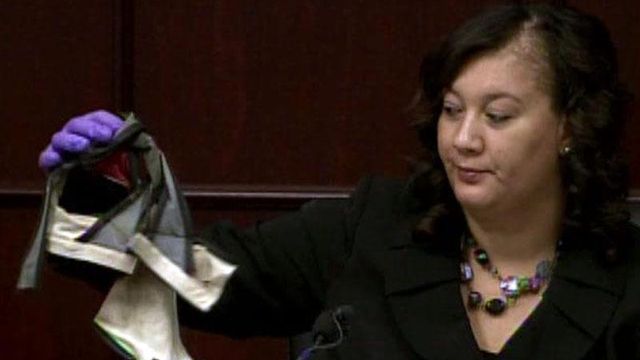Blood found beneath Nancy Cooper's fingernails
A forensic scientist testified for the state Wednesday in the murder trial of a Cary man accused of killing his wife that there was no DNA and little blood found on pieces of evidence collected in the investigation.
Posted — UpdatedBut Ivy McMillan, an agent with the North Carolina State Bureau of Investigation, said she was never able to obtain a DNA sample from it to determine whose blood it was.
It isn't uncommon though, she said, for DNA evidence to degrade or be washed away because of environmental factors, such as heat and moisture.
Prosecutors have said Brad Cooper, 37, killed his wife inside their home during the early-morning hours of July 12, 2008, and transported her to a construction site in an undeveloped subdivision just outside Cary's town limit.
A man walking his dog found Nancy Cooper's partially clad, decomposed body face down in a drainage ditch two days later.
McMillan also testified that she was unable to obtain DNA profiles from several other pieces of evidence removed from the Coopers' home, including a pink, oval rug, a pillow case, and part of the trunk floor from the defendant's car.
There was also no evidence of semen or sperm in swab samples she tested from a sexual assault kit, but she said on cross-examination by defense attorneys that heat and an insect infestation of the body could have destroyed any evidence.
A teal dress that witnesses have said Nancy Cooper was wearing during a party the night before her death also was absent of any blood evidence, McMillan said, but she did find a "small grease-like stain" on it that wasn't bodily fluid. She couldn't say what the stain might have been.
Brad Cooper has said that his wife told him at the party that she had a stain on the dress, although several witnesses said they never saw a stain nor did she tell them about a stain.
Defense attorneys have criticized the tactics Cary police used to solve Nancy Cooper's homicide, saying they only sought out evidence that could prove their client was guilty and ignored evidence or delayed testing items that could have proved otherwise.
One such item was a cigarette butt found near Nancy Cooper's body, they have said.
Prosecutors questioned SBI forensic DNA analyst Michelle Hannon about that cigarette butt on Wednesday. She said it too was absent of DNA but that it was crinkled and appeared to have been old.
Two other cigarette butts that were submitted for testing did test positive for an unknown DNA profile, she said. They were collected from Kildaire Farm Road in Cary from "someone who made a strange comment about a poster," Hannon said, but she didn't elaborate.
Much of Wednesday afternoon focused on testimony from a Cary police detective who seized computers from the Cooper home in the days after Nancy Cooper's body was found.
Defense attorney Howard Kurtz cross-examined detective Jason Ice for nearly an hour about methods he used to secure the computers.
In opening statements, Kurtz said forensic protocols on computer evidence were ignored and that hundreds of files on Brad Cooper's computer had been tampered with while in control of police.
At the conclusion of Wednesday's proceedings, Kurtz apologized to the court and to the prosecution team for his questioning of their ethics. Earlier, Kurtz accused the state of not informing defense attorneys of their plans to call Ice to testify.
Cross-examination of Ice is expected to resume Thursday morning.
Related Topics
• Credits
Copyright 2024 by Capitol Broadcasting Company. All rights reserved. This material may not be published, broadcast, rewritten or redistributed.






